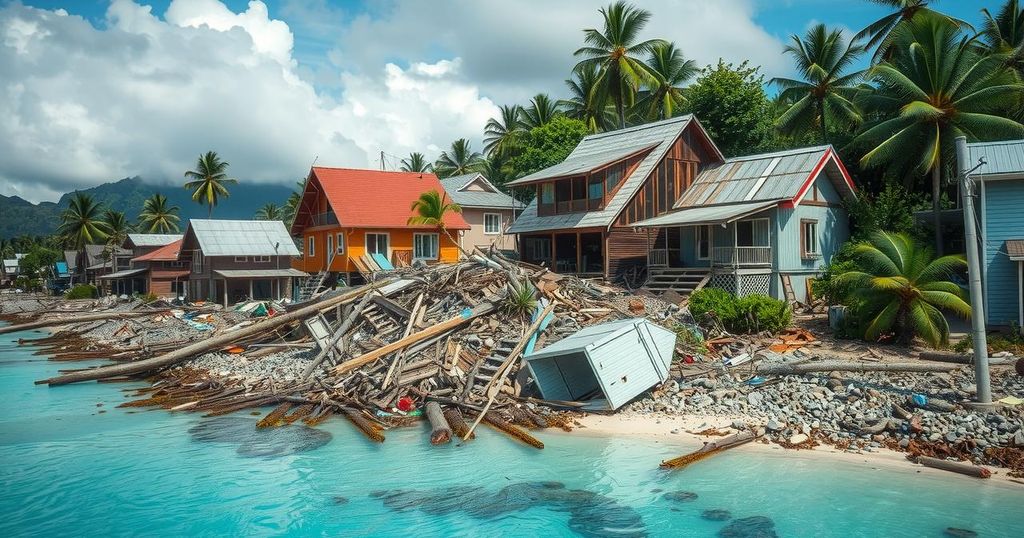Cyclone Chido and Vanuatu Earthquake: A Humanitarian Crisis Unfolds

The recent devastation caused by Tropical Cyclone Chido and a subsequent earthquake in Vanuatu has resulted in catastrophic damage and significant loss of life. Cyclone Chido particularly affected Mayotte, Comoros, and Mozambique, causing unprecedented destruction. In response, Direct Relief is coordinating support efforts and assessing healthcare needs in these regions. The immediate threats to health include disease outbreaks, displacement, and disrupted healthcare access, highlighting the importance of timely medical assistance in disaster recovery.
Over the weekend, Tropical Cyclone Chido wreaked havoc across the Mayotte archipelago, Comoros, and Mozambique, resulting in catastrophic devastation and significant loss of life. Just days later, a 7.3-magnitude earthquake struck the island nation of Vanuatu, further complicating an already challenging scenario for communities facing heightened vulnerabilities. Cyclone Chido has been recognized as the most powerful storm to impact Mayotte in nearly a century, with wind speeds surpassing 140 miles per hour and storm surges reaching 28 feet, obliterating neighborhoods, particularly those housing undocumented migrants. The initial death toll reported in Mayotte stands at 22, yet estimates suggest that total casualties could rise significantly as evaluations of the damage continue.
In the nearby Comoros islands, Cyclone Chido caused similarly destructive winds and copious rainfall, leading to substantial damage and loss of life, prompting President Azali Assoumani to declare a week of mourning. Mozambique, a country already susceptible to severe weather events, suffered from the full impact of Chido, specifically in the Cabo Delgado province, where winds exceeded 160 miles per hour. Extensive damages to homes, infrastructure, and healthcare facilities have been reported in the region.
Direct Relief is actively assessing the needs of these affected communities. In Mayotte, the organization is collaborating with French emergency response agencies to meet immediate healthcare requirements. In Comoros, Direct Relief is partnering with Santé Diabète to gauge the situation and provide necessary assistance, while ongoing outreach to Mozambique’s Ministry of Health aims to deliver medical supplies and logistical support. Concurrently, a powerful earthquake in Vanuatu has resulted in widespread destruction, with damage assessments ongoing but indicating significant impacts on homes and public facilities. Direct Relief is coordinating with local healthcare partners to address urgent needs, including dispatching emergency medical supplies.
These natural disasters pose immediate and long-lasting threats to human health. Severe storms and earthquakes can lead to mass casualties and injuries, overwhelming local healthcare infrastructures. Post-disaster, communities face heightened risks of disease outbreaks due to contaminated water, increased displacement resulting in overcrowded living conditions, and disrupted access to essential healthcare for chronic conditions. Maternal and infant health is especially vulnerable, as access to emergency care becomes compromised. Direct Relief is proactively addressing these challenges by ensuring essential medical supplies reach frontline healthcare providers.
With a longstanding commitment to disaster response, Direct Relief has a proven track record of delivering critical medical resources during significant natural catastrophes. In response to recent events, the organization aims to provide timely medical assistance and support local health systems to ensure that disaster-affected communities regain essential medical care during recovery. Direct Relief continually prepositions medical supplies in high-risk regions to ensure readiness for potential disasters. As the impacts of Cyclone Chido and the Vanuatu earthquake unfold, Direct Relief remains steadfast in its commitment to support healthcare providers and affected communities in their recovery efforts.
Recent natural disasters, including Tropical Cyclone Chido and a powerful earthquake in Vanuatu, have highlighted the devastating effects of severe weather and geological events on human health and infrastructure. Cyclone Chido hit Mayotte, Comoros, and Mozambique with unprecedented intensity, resulting in extensive loss of life, destruction of homes, and overwhelming local healthcare systems. Similarly, the earthquake in Vanuatu has posed serious challenges to medical infrastructure and community health. The immediate and long-term health threats associated with such disasters include casualties, disease outbreaks, and interrupted healthcare for chronic conditions. Organizations like Direct Relief play a vital role in providing emergency medical supplies, addressing public health needs, and facilitating recovery efforts in disaster-stricken areas.
In conclusion, the severe impact of Tropical Cyclone Chido and the earthquake in Vanuatu reflects the myriad challenges faced by communities vulnerable to natural disasters. These events not only cause immediate casualties and destruction of infrastructure but also pose long-term risks to public health. Direct Relief’s ongoing commitment to disaster response and healthcare support underscores the importance of timely medical assistance and resource provision in facilitating recovery and rebuilding efforts in affected regions. As communities navigate these challenges, the concerted efforts of organizations dedicated to humanitarian aid will be crucial in fostering resilience and restoring health services.
Original Source: www.directrelief.org





